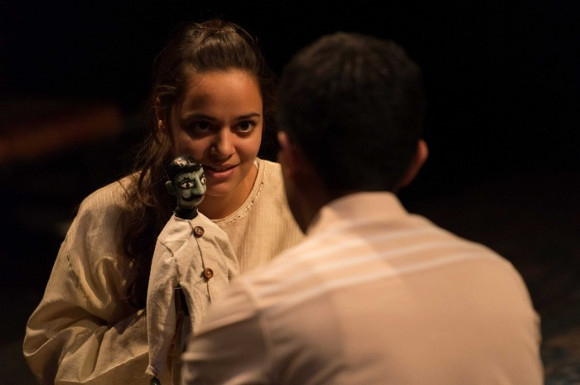The Djinns of Eidgah

© Manuel Harlan
The title translates as the ghosts in an outdoor mosque in the Kashmir region of India, and Bangalore-based playwright Abhishek Majumdar has woven a few true stories of dreams, religious conflict, terrorism and violence into a mythical, magical scenario of Islamic story-telling.
That’s the good news. The less good news is that quite a lot of the play is hard to follow – a good programme note, plus glossary, would help – and Richard Twyman‘s well-cast, spiritedly acted production is confusingly under-lit, especially at the start of the second half.
Starting with the audience seated either side of a long mosquito net, two children are told a bed-time story of ghosts, dreams and sorcerers which segues into the tale of two grown-up Muslim siblings in strife-torn Kashmir: Bilal (Danny Ashok) who is a promising footballer, impervious to riots on the street, and edgy, troubled Ashrafi (Aysha Kala) who is visiting the overworked psychiatrist (Vincent Ebrahim).
The doctor has troubles of his own with a dissenting assistant and the ghost of a politicised son who died fighting for the mujahideen. The goalposts on the football pitch are moved in Tom Scutt‘s clever design to form a barricade outside the mosque where two Hindu soldiers – the best written characters in the play, and superbly acted by Paul Bazely and Jaz Deol – bicker and keep guns trained on the protesters.
Before the escalation of violence, we are immersed in a sort of limbo between life and death where the djinns hold sway, the Koran is discussed for its allowance of violence (or not), children haunt their parents and vice versa, and the boy who trained with the Afghan mujahideen is portrayed as either terrorist or freedom fighter.
The play, which is a result of the Royal Court’s long-running (since 2001) workshop project in Mumbai, has an urgency and imaginative power that is not fully matched in its technical execution, or narrative structure, but there is no questioning the value of the piece as a restless, muddled, occasionally informative and disturbing report from a political hotspot that shows little sign of cooling off.










